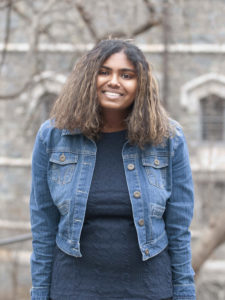Throughout my life, I have often been asked the quintessential question for people of color: Where are you really from?

Emily Thampoe
People usually seem surprised when I mention that I am South Asian, even some of my fellow South Asians.
Some people have even told me, Oh, I thought you were Black.
I used to be hurt when people misjudged my race, always wondering, Why do people see me as someone that I am not?
Do I act a certain way? What is it about me that makes people think I am a completely different race than I am?
Perhaps it is because I have darker skin than the average person of Indian origin or that I have a prominent set of curls on my head.
Or perhaps it is because I was given an English first name, due to being born into a Catholic family.
I will never know for sure, but what I do know — the moments that I have spent being uncomfortable because someone asked me where I was really from or complimented me on my “beautiful” complexion are nothing in comparison to the way that Black folks are treated globally.
I accept these moments of discomfort and also acknowledge the privilege I have as an Asian American, especially as one who grew up in a predominantly white, affluent town in the New Jersey suburbs.
I use these comparatively trivial moments as even more of a reason to stand with and advocate for people of color and members of other marginalized communities, who are harassed or even killed for things they cannot help, such as the color of their skin, their sexuality or their gender identity.
Even as a young brown American, I will most likely never be wrongfully harassed or murdered for carrying a packet of Skittles down the street or in an unwarranted drug bust or for allegedly using a counterfeit $20 bill.
As students in America, we have been taught about the various landmark events of the Civil Rights movement in the 1960s.
We have been taught about Dr. Martin Luther King, Jr., who used his voice throughout his short life to advocate for equal rights for his fellow Black Americans, through nonviolent means. He was then, ironically, assassinated in 1968, while standing on the balcony of the Lorraine Motel in Memphis, Tennessee. In the days following his assassination, riots broke out across the nation.
We are taught about strides toward equal treatment, almost as if these prejudice acts are a thing of the past. Yet we still see and hear of innocent Black people being senselessly murdered in the year 2020.
There is a laundry list of Black individuals who have been needlessly killed in the 21st century, including Trayvon Martin, Eric Garner, Ahmaud Arbery, Breonna Taylor and George Floyd — along with countless others whose murders have not seen the light of day, at least in terms of the mainstream media.
People across the country and across the world have been protesting for eight days and counting following the senseless murder of George Floyd at the hands of police in Minneapolis, Minnesota, last Monday.
Buildings have been burned down, stores have been looted, civilians have been shot with rubber bullets, tear gas has been sprayed in the streets, journalists have been arrested, just to scratch the surface.
Just days ago, the president threatened violence on those looting via Twitter on May 30. And on June 2, he addressed the nation from the Rose Garden, where just a few hundred feet away militarized law enforcement were inflicting tear gas on peaceful protesters.
After declaring himself the “law and order president” and sharing that he would be employing more law enforcement to stop protests, President Donald Trump walked to St. John’s Episcopal Church, which was burned the night prior, just to take a photo outside in which he was holding a bible — upside down no less.
Watching the protests in Washington side-by-side with Trump’s speech in real time was harrowing.
I was sick to my stomach, just thinking about how these protesters and the people they are fighting for must feel.
Needless to say, there is much to be distraught about.
The frustration that the nation and the world has been voicing this week needs to continue to mobilize citizens to take action, past performative social media posts.
Tagging 10 friends and posting a black square in acknowledgment of the Black Lives Matter movement is not enough.
We need to share resources with ourselves and others in order to educate ourselves and take action.
We need to keep saying the names of the victims of police brutality and advocating for legislation that reforms policing practices.
We need to continue to amplify black voices because we would be nowhere if not for the contributions that black individuals have made to society, through art, activism and so much more.
To my Black siblings in the United States and across the globe — I am so sorry for how you are treated. I know sorry is not enough, but I will continue to educate myself and fight for you. You deserve more and you deserve better.
Emily Thampoe is a community engagement editor for The Brown and White. She can be reached at ept421@lehigh.edu.





Comment policy
Comments posted to The Brown and White website are reviewed by a moderator before being approved. Incendiary speech or harassing language, including comments targeted at individuals, may be deemed unacceptable and not published. Spam and other soliciting will also be declined.
The Brown and White also reserves the right to not publish entirely anonymous comments.